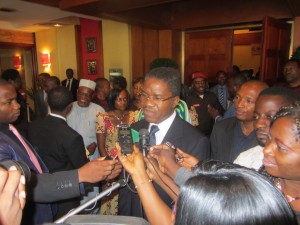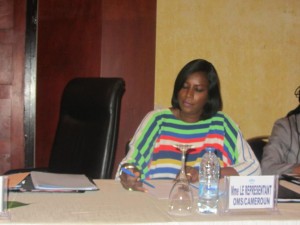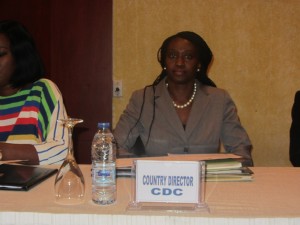Wilfred Enow Agbor
Yaounde, Cameroon
Centers for Disease Control and Prevention (CDC), World Health Organization (WHO), Save Blood for Africa (SBFA), the Chantal Biya Foundation and other partners came together to support the Cameroon government sensitize the public in voluntary blood donation.
These partners met early last week at the Hilton Hotel in Yaoundé under the auspices of the Minister of Public Health, André Mama Fouda. Present at the event were Charlotte
Ndiaye of WHO and Dr. Omotayo Bolu, M.D., Director, CDC Yaoundé – all were available to support Mr. Fouda in the campaign for voluntary blood donation.
In a speech during the meeting, the Minister made an appeal to all partners involve by referencing the Prime Ministerial decree no2011/409 of December 2011 that requires him to organize and ensure that a certain quantity of blood is collected through the National Blood Transfusion Program to
help those who face blood shortages in hospitals. He called for everyone to adopt a participatory approach in donating blood, since this is the only way the nation can achieve required blood for the needy.
In support to the Minister’s appeal, Charlotte Ndiaye of WHO explained to the audience that the campaign for blood donation started in December 5th2013 when it was discovered that so many people died due to loss of blood and lack of reserves at the blood bank. Doctor
Ndongo Jean Audrey De Jesus in charge of the Mother and Child Center at the Chantal Biya Foundation echoed the same sentiment when he added that blood is needed for anemic patients, patients involved in accidents and it is need to save women who die during child birth due to excessive loss of blood.
In an effort to alleviate donated blood shortages, Doctor Omotayo Bolu described blood donation as a modest investment but she espoused on its dire need. Dr. Bolu explained that 460,000 pines of blood were needed for the year 2013 only about 70,000 pines were collected. Ninety percent of those who donated this blood were family members with only 10 percent from public voluntary donors. She added that if the required quantity of blood is collected, it can stop so many deaths. She regretted the fact that over 80 percent of Cameroonians who are willing to donate blood do not know how and where to go – they need information on how and where to donate blood.
Doctor Bolu concluded that blood donation drives need finance and materials. Hence, she added that the United States government, through CDC, will work together with WHO and other partners to support the government of Cameroon with finance and equipment necessary for the campaign to meet the goal the country’s National Blood Transfusion Program.






